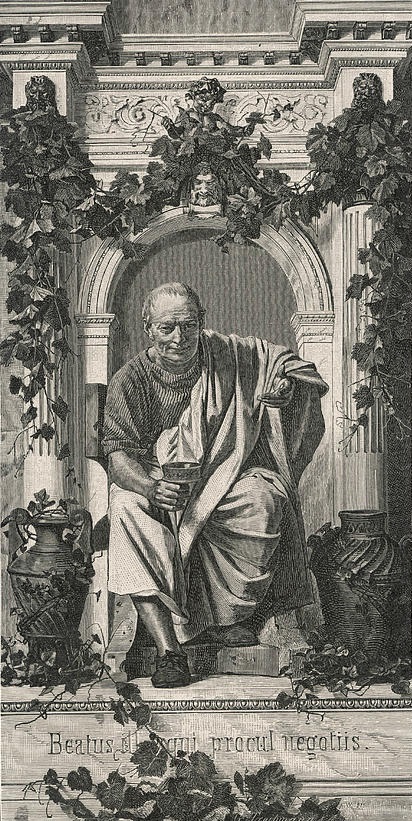
Quintus Horatius Flaccus, by Anton von Werner
Horace (8 December 65–27 November 8 BCE) was the foremost Roman poet during the reign of Augustus Caesar, and wrote during the sea change which took Rome from a republic to an empire. His volumes of poetry are the Satires, Odes, Epodes, Epistles, Ars Poetica, and Carmen Saeculare. Many of his poems dealt with themes such as love, philosophy, politics, ethics, poetry itself, and his social life.
Horace appears in Canto IV of Inferno, as one of the great poets stuck in Limbo on account of not being Christians.
Horace is the French and English form of the Latin name Horatius, which possibly derives from hora, “time, hour, season.” Another theory suggests it may be Etruscan in origin.

Helen of Troy, by Dante Gabriel Rossetti
Helen of Troy appears in Canto V of Inferno, as a carnal sinner in the Second Circle of Hell. She was the daughter of Zeus and Leda, a sister of Clytemnestra, Castor, and Pollux, and the wife of King Menelaus of Mycenae. I’m assuming all my readers are familiar with at least the basics of her story in Greek mythology, wherein she’s abducted by Prince Paris of Troy and thus indirectly brings about the Trojan War.
There are several different versions of Helen’s fate, and whether she were abducted or seduced by Paris. However, the best-known version comes from Homer in his Iliad and Odyssey, where she’s rescued and reunited with Menelaus. Helen was said to be the most beautiful woman in the world, and had quite a few suitors. She was called “the face that sailed a thousand ships,” though when I was about twelve, I committed quite a malapropism by calling her “a face that sank a thousand ships”!
Helen is the English form of the Greek name Helene, which probably means “torch” or “corposant.” It’s also been suggested the name may be related to Selene, which means Moon. Possibly the most famous bearer of the name, apart from Helen of Troy, was Helen Keller.
I’m particularly fond of the Helena variation. I also like the French form Hélène, the Dutch form Heleen, the Spanish and Italian form Elena, the Russian form Yelena, the Hungarian form Ilona, and the Finnish form Heleena. I also like the Ileana variation in Romanian.


From that painting, Helen looks like she has a black eye/ bruised cheek. 🤔
Helen is the name of a famous Indian actor from the 60’s-70’s also, so does not feel all that uncommon to me. Personally, have never come across anybody named Horace, except for in period literature.
Best wishes,
Nilanjana.
Ninja Minion, A-Z 2016
Madly-in-Verse
Pingback: A to Z Reflections 2016 | Onomastics Outside the Box